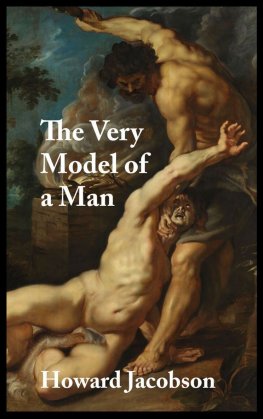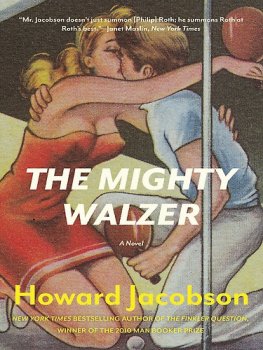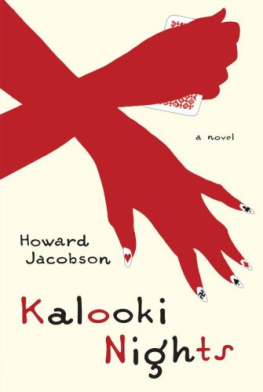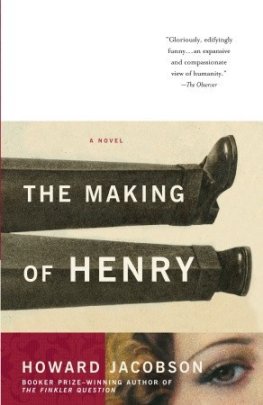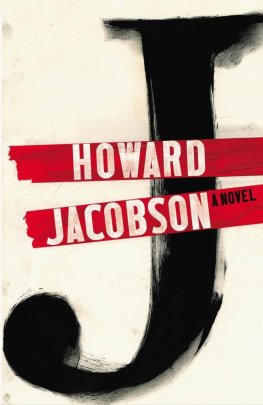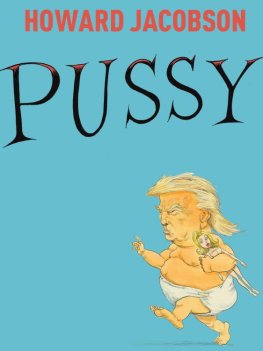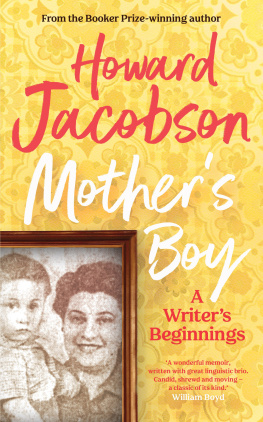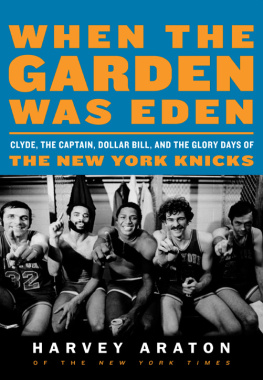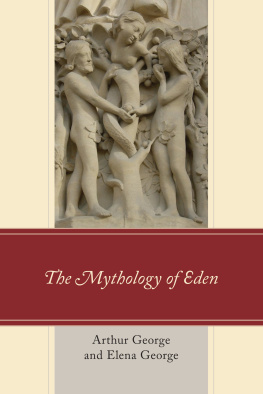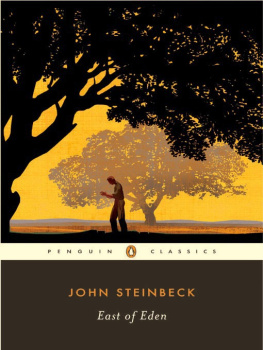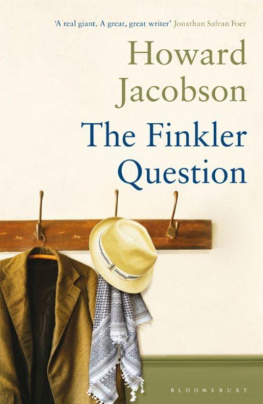Howard Jacobson
The Very Model Of A Man
Re-reading ones own novels after many years is always a fraught business, but when a novel has fallen out of print The Very Model of a Man is the only novel of mine that has and so crops up infrequently in conversations with readers or indeed with oneself, revisiting it can be perilous. My understanding of why this novel has been out of print is that, despite enthusiastic notices, it slipped between the cracks that can open when you change publishers: the second publisher having eyes only for new material, the first publisher not being quite done with the old. But what if a re-reading shows some other reason? What if it isnt very good? Or what if and this could be more painful still it is too good? Has the world been denied a masterpiece and the author credit for it?
Long before I had published anything I was an avid reader of the prefaces Henry James wrote for the New York Edition of his works. Easier than getting on and writing was daydreaming about an eminence from which, in my later years, I would look back on all I had produced. James prefaces are elegant and, by modern expectations, difficult. My clearest remembrance of any provoking cause connected with the matter of the present volume, is how he begins his preface to The Lesson of the Master words which cannot be said to be obscure but are certainly orotund. We dont speak of provoking causes today; we tell how we got the idea for a book. Though, of course, a provoking cause is infinitely more suggestive than an idea.
The provoking causes connected to the writing of The Very Model of a Man first published 23 years ago are not all clear to me now and probably werent at the time. Such provocations are likely to be many and, of those, some will never escape the dark well of the inchoate from which the novelist half the time doesnt know hes drawing. And nor should they. The novel they induce is emergence enough.
But I do recall that this novel was written with by my standards unusual deliberation. I was consciously wanting to do something different from the three novels I had previously written. Some change had to be effected, it seemed to me, to the way comedy was generally talked about and, more particularly, to the way I was talked about as a writer of comic novels. I was not in my own eyes a comic novelist, no matter that I thought every novelist had an obligation to remember his great forbears Rabelais and Cervantes and make merry, as they had, with sanctimony, hypocrisy, grandiosity, death. Critics had noticed other tones and intentions in my work, all right, but had set what was serious at odds with what was comic in a way I didnt think was helpful. My novels werent serious and funny; they were serious because funny. If that wasnt evident I needed to make it so. Not by eschewing comedy that would have been an act of treason against the very idea of the novel but by writing to a theme whose seriousness could never be in doubt. A novel, not lacking grave comedy, that addressed God, creation, fratricide, vagabondage the story of Cain and Abel, in short. That would surely fix it.
This isnt to say that a grand theme assures grandeur of performance. Many a trivial novel has been written about an important subject, and many a profound one about nothing in particular. But at least this time my ambition would be on the table.
There are countless solemn themes I might have chosen, so what was the cause that provoked this one? Thats simply answered: the fact of my being the first-born son. I hadnt brooded on murdering my brother. But then I hadnt brooded on murdering my father and marrying my mother either. Our connection to the great myths of our natures is murky. A mother might see the Medea in herself without imagining she will ever do away with her children. Literature more often tells the story of impulses we dont act on than of ones we do. I could joke about the Cain and Abel story with my brother without expecting him to be worried, though its always possible he was more anxious than he let on. Did he know that when we were both teenagers sharing a room I would get up in the night to listen to his breathing? Did he know how much I feared for his safety?
It was all, of course, a joke. Its joking we have to thank for the sanity that keeps the great myths of destructiveness at bay. But that which we joke about most must be a preoccupation of some sort, and I thought myself well-placed to imagine myself into Cains position. You dont have to hate your brother to have an inkling of how youd feel if God were to prefer the incense of his burnt offering to yours. To know what it would be to hear oneself cursed from the earth and sent out into an unpeopled world as a fugitive and vagabond might require a more than usual consciousness of worthlessness, but that too I believed I could write my way into.
The real difficulty, as I envisaged it, would not be entering into Cains story, but finding a language appropriate to the telling of it an idiom that could at once feel contemporary while retaining some of the simple augustness of expression of the original. I open the novel again after all these years and fall randomly on the account of Cains assault upon his brother. When I pulled him close, I couldnt be certain he was not my father, not my mother, not myself. Get very close and you lose a person altogether He almost fell apart in my arms. And when I began to punch him, not hard but persistently all that was ponderable in him, all that gave him weight and all that lent density to his whiteness, all that was silver, all that was milk fled his body. And at once I see what I was really writing about the lure of language, the fragility of self, the sadness of families and how close hatred is to love.
Howard Jacobson, March 2015
Rabbah b. Bar Hanah said in the name of R. Johanan: One who descants upon the praises of the Holy One (blessed be He) to excess, is uprooted from the world.
The Babylonian Talmud
Then God says to Cain: Thou art cursed from the earth which hath opened its mouth to receive thy brothers blood at thy hand So the unbelieving people of the Jews is cursed from the earth, that is, from the church
Augustine, Reply to Faustus the Manichaean
To the life about me, to the people who made up the world I knew, I could not attach my signature. I was as definitely outside their world as a cannibal is outside the bounds of civilized society I should have been a clown
Henry Miller, Tropic of Capricorn
1. Cain Remembers a Birthday
The Lord was our shepherd. We did not want. He fed us in green and fat pastures, gave us to drink from deep waters, made us to lie in a good fold. That which was lost, He sought; that which was broken, He bound up; that which was driven away, He brought again into the flock. Excellent, excellent, had we been sheep.
There was no eluding His watchfulness. His solicitude lodged with us, His voice stalked our movements and our thoughts. The walking voice. Wheresoever we went, whatsoever we had a mind to, It followed. No matter the hour, whether in the cool of the day or in the hot, we heard Its step upon our heel, sometimes affecting an idle fitfulness of direction a voice out for a mere stretch and perambulation sometimes unable to disguise the predatory intention of Its tread a prowling, meat-hungry voice; but always we felt Its ancient breath, fiery and sour like an ailing lions, on our necks.
There was no escaping Him, whatever the occasion. But that day that day with lambing going on and the whole of heaven, so it seemed, in a pastoral flutter, He was more than usually in the way. All afternoon His voice paced amongst us, hectoring, fussing, dithering and indecorous

